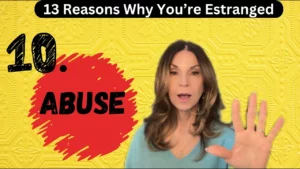Adult child estrangement is a profound and intricate experience that, unfortunately, many families find themselves entangled in. The journey is laden with emotional turmoil, often stemming from unresolved issues, misunderstandings, or the culmination of longstanding family dynamics that have reached a breaking point. In the shadows of estrangement exists an unspoken pain—a pain that demands acknowledgment and understanding.
Always consider the complexities of families and estrangement. Families torn apart by the silence and distance between parent and child navigate a landscape where hearts ache and confusion reigns supreme. It’s crucial to recognize and address this pain head-on, for the healing process can truly begin only by acknowledging the depth of the wounds.
The Power of Forgiveness:
Amid this tumultuous journey, forgiveness emerges as a beacon of hope—an antidote to the poison of resentment and anger that permeate estranged relationships. It’s essential, however, to grasp the true nature of forgiveness. It is not an endorsement or acceptance of the actions that led to estrangement; instead, it is a profound gift one bestows upon oneself.
Forgiveness is a conscious choice to liberate the heart from the suffocating hold of negative emotions. It’s an act of self-compassion, allowing the individual to break free from the chains of bitterness for their well-being. Understanding this transformative power of forgiveness is the first step toward healing the wounds of adult-child estrangement.
Self-Reflection:
Embarking on the path of forgiveness necessitates deep self-reflection. Take the time to delve into the recesses of your soul, gaining clarity on your role in the estrangement. In this context, self-awareness is not about apportioning blame but comprehending your part in the intricate narrative of familial discord.
It’s crucial to emphasize that forgiveness doesn’t imply forgetting. Instead, it is a conscious decision to move forward without the weight of resentment, allowing room for growth and understanding in the process.
Empathy and Compassion:
In the pursuit of reconciliation, empathy becomes a formidable tool—endeavor to perceive the situation through the lens of your estranged adult child. Kindness creates a bridge of understanding, connecting hearts that have drifted apart. Compassion—both for yourself and your child—is equally vital as it forms the bedrock of a healing environment where safety and understanding can flourish.Fostering an atmosphere of empathy and compassion is integral to rebuilding fractured relationships.
Open Communication:
Initiating honest and open communication is pivotal to rebuilding relationships. Share your feelings without casting blame or accusation, creating a space for vulnerability and authenticity. Equally important is active listening—listening to your adult child’s perspective with an open heart and mind.
Even if there is disagreement, validating their emotions and experiences is crucial. When approached with sincerity and openness, communication possesses the transformative power to mend the most fragile bonds.
Setting Boundaries:
Establishing clear boundaries is vital for the reconstruction of a healthy relationship. Engage in open discussions about expectations and be willing to compromise to rebuild trust. Boundaries, when established with respect and consideration, create a framework for respectful and mutually beneficial interactions. Setting boundaries is not an act of control but rather a collaborative effort to ensure the well-being of both parties involved.
Seeking Professional Help:
The complexity of adult-child estrangement often necessitates external guidance. Family therapy and estrangement coaching provide a safe space for both parties to express themselves. A neutral third party can offer insights and advice that may be challenging to achieve independently. Seeking professional help is not a sign of weakness but a courageous step toward healing and understanding.
Patience and Persistence:
Rebuilding a relationship is a journey, not a destination. Exercise patience and persistence in your efforts, celebrating small victories and progress even if it unfolds slowly. Setbacks may occur, but view them as opportunities for learning and growth, stepping stones toward a brighter future.
Learning and Growth:
View the experience of estrangement as an opportunity for personal growth and self-improvement. Recognize that forgiveness is not a one-time event but a continuous process. Embrace setbacks as chances to learn and refine your approach, keeping your focus on moving forward. Each challenge becomes a lesson, guiding you toward a more profound understanding of yourself and your relationships.
Hope and Healing:
While holding onto the hope of reconciliation, don’t let it overshadow the importance of finding contentment and joy in your life, regardless of the outcome. Healing is a journey that involves both individual and collective efforts. Sometimes, the most profound transformations occur when we prioritize our well-being, letting the ripple effect touch those around us.
Conclusion:
Forgiveness emerges as a potent tool in the intricate tapestry of adult-child estrangement. It possesses the potential to repair relationships, foster understanding, and pave the way toward a healthier, more connected bond. Embrace the journey of forgiveness with open hearts, recognizing that it is not just a gift to your estranged loved one but, perhaps more importantly, a gift to yourself—an act of self-love and liberation that transcends the confines of estrangement, fostering hope for a brighter future.









